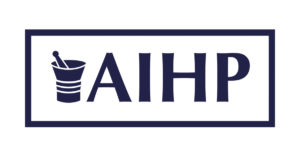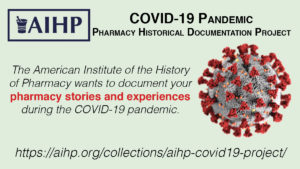From the Collections is a recurring feature at aihp.org that highlights articles, artifacts, images, and other items of interest from AIHP publications and collections. This post is contributed by William A. Zellmer, AIHP Advisor for Pharmacy Outreach. October 15, 2020.
In October
2020, as these words are being written, every day brings new reports about the
nature of the SARS-CoV-2 pandemic and the search for
effective vaccines and treatments. Often, we are awestruck by the depth and
breadth of scientific knowledge being applied to quell this threat to humanity.
The continual flood of new information about covid from scientific and not-so-scientific researchers,
however, can be overwhelming and confusing. Do we risk becoming jaded about competing
claims of efficacy and mistrust the labor of the leading scientists and
clinicians who are charting the way out of this pandemic? Would
some historical perspective be timely?
Consider Donald D. Vogt’s excellent 1974 Pharmacy in History article, “Trends in 19th Century American Cholera Therapy” (open access until July 1, 2021!), about the chaos—intellectual, scientific, and political—surrounding the treatment of cholera in the 1800s. Vogt, of the Northeast Louisiana University School of Pharmacy, explained:
Almost every aspect of cholera was confusing. The etiology and mode of transmission were obscure. Methods used with alleged success by one practitioner could seldom be duplicated with predictable results by the next. Heavy mortality, in a given area, at the onset of the epidemic was ordinarily much reduced toward the end of the outbreak, giving rise to a false optimism that the mode of treatment had somehow been effective.
During the tumultuous and fast-changing
epidemics, Vogt pointed out, many doctors relied “upon earlier modes of
treatments.” As a result, he argued, “medical sectarianism—a mixture of
protest, ignorance, and pretension—exerted pressure upon medical practice” as
patients clamored for and encountered innumerable new cures and remedies.
Pharmacists of that era, too, faced a crowded
marketplace:
The pressure of epidemic disease, including cholera, directly increased the demand for drugs and indirectly helped to intensify competition among diverse groups pharmaceutically involved: professionally-oriented pharmacists, a larger variegated group of “druggists,” dispensing physicians, lay practitioners, sectarian practitioners, nostrum manufacturers.
Vogt observed that “there was little opportunity
for the professional development of pharmacy to dominate this confused area.” He
elaborated that, “while pharmacy was involved at every level, it did little to
shape the course of therapy.” Nevertheless, he concluded, cholera epidemics
eventually “stimulated… pharmacy and medicine to re-examine critically their
progress and goals.”
By the time of the 1918 influenza pandemic, infectious diseases were better understood, albeit still incompletely. Dr. John B. Grabenstein explained these developments in his recent lecture, “Vaccines & Epidemics: Successes & Crises from Smallpox to COVID-19” at AIHP’s New Social History of Pharmacy and Pharmaceuticals Festival.
Grabenstein’s presentation cited John M. Barry’s 2018 book, The Great Influenza—The Story of the Deadliest Pandemic in History, which provides historical perspective more directly relevant to our current situation. Barry’s research traces the evolution of scientific medicine, including the understanding of the etiology of infectious diseases. Barry also summarizes the lessons that should have already been learned about effective pandemic responses.
The state of the science directed towards blunting the covid-19 pandemic seems even more awesome when considering the history—and the continuing “mixture of protest, ignorance, and pretension”—that have led us to this point.



 The American Institute of the History of Pharmacy is documenting and preserving pharmacy stories and experiences during the COVID-19 global pandemic for the benefit of future historians and scholars. We seek to record the effects of this public health emergency on all types of pharmacy experiences. We invite you to share your pharmacy stories, photos, videos, artifacts, and other documentation of the COVID-19 coronavirus pandemic.
The American Institute of the History of Pharmacy is documenting and preserving pharmacy stories and experiences during the COVID-19 global pandemic for the benefit of future historians and scholars. We seek to record the effects of this public health emergency on all types of pharmacy experiences. We invite you to share your pharmacy stories, photos, videos, artifacts, and other documentation of the COVID-19 coronavirus pandemic.